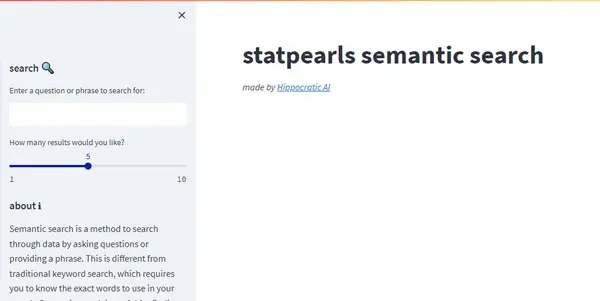Hippocratic AI

A medical knowledge research tool that uses statpearls as a database
Hippocratic AI: A Deep Dive into StatPearls-Powered Medical Knowledge Research
Hippocratic AI is a free, medical knowledge research tool that leverages the extensive database of StatPearls to provide physicians and medical students with quick access to reliable and up-to-date medical information. This article will explore its functionality, features, applications, and comparative advantages.
What Hippocratic AI Does
Hippocratic AI acts as a sophisticated search engine specifically designed for medical professionals. It allows users to quickly find relevant information within the vast StatPearls library using natural language queries. Unlike traditional searching through StatPearls' website, Hippocratic AI aims to streamline the process, providing concise and pertinent answers directly related to the user's question. Its core function is to translate complex medical inquiries into easily digestible summaries sourced from the authoritative content within StatPearls.
Main Features and Benefits
- Natural Language Processing (NLP): Hippocratic AI understands medical terminology and nuanced language, allowing for efficient searches using everyday language rather than complex medical keywords.
- StatPearls Integration: Direct access to the comprehensive and regularly updated StatPearls database ensures the information provided is accurate and reflects current medical best practices.
- Concise Summaries: Instead of delivering lengthy articles, Hippocratic AI focuses on providing concise and focused answers, saving valuable time for busy medical professionals.
- Improved Efficiency: The tool significantly reduces the time spent searching for information, allowing users to focus on patient care and other critical tasks.
- Accessibility: Being free to use, Hippocratic AI removes a significant financial barrier to accessing high-quality medical information.
Use Cases and Applications
Hippocratic AI finds application across various medical settings and specialties:
- Point-of-Care Decision Support: Quickly access essential information during patient consultations to inform diagnosis and treatment plans.
- Medical Student Education: Supplement textbooks and lectures with readily available, concise summaries of complex medical topics.
- Continuing Medical Education (CME): Efficiently review specific medical concepts for ongoing professional development.
- Research Support: Quickly gather relevant information to support research projects and publications.
- Rapid Knowledge Retrieval: Locate information on rare diseases or unusual presentations, enhancing diagnostic capabilities.
Comparison to Similar Tools
While several medical knowledge databases and search engines exist, Hippocratic AI distinguishes itself through its focus on concise summaries derived from the authoritative StatPearls resource and its user-friendly interface built around NLP. Other tools may require more detailed search queries or provide overwhelming amounts of information. Hippocratic AI aims to provide the "just-in-time" information needed, without unnecessary complexity. Specific comparisons to tools like UpToDate or DynaMed require a detailed feature-by-feature analysis, but Hippocratic AI’s free access and concise output represent a key differentiating factor.
Pricing Information
Hippocratic AI is currently free to use.
Conclusion
Hippocratic AI offers a valuable resource for medical professionals and students seeking efficient access to high-quality medical information. Its integration with StatPearls, combined with its natural language processing capabilities and focus on concise summaries, makes it a powerful tool for improving efficiency and enhancing medical decision-making. The free accessibility further broadens its reach, making reliable medical knowledge more readily available.